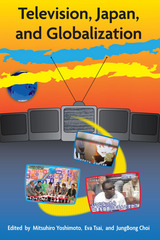2 books about Yoshimoto, Mitsuhiro

Kurosawa
Film Studies and Japanese Cinema
Mitsuhiro Yoshimoto
Duke University Press, 2000
The films of Akira Kurosawa have had an immense effect on the way the Japanese have viewed themselves as a nation and on the way the West has viewed Japan. In this comprehensive and theoretically informed study of the influential director’s cinema, Mitsuhiro Yoshimoto definitively analyzes Kurosawa’s entire body of work, from 1943’s Sanshiro Sugata to 1993’s Madadayo. In scrutinizing this oeuvre, Yoshimoto shifts the ground upon which the scholarship on Japanese cinema has been built and questions its dominant interpretive frameworks and critical assumptions.
Arguing that Kurosawa’s films arouse anxiety in Japanese and Western critics because the films problematize Japan’s self-image and the West’s image of Japan, Yoshimoto challenges widely circulating clichés about the films and shows how these works constitute narrative answers to sociocultural contradictions and institutional dilemmas. While fully acknowledging the achievement of Kurosawa as a filmmaker, Yoshimoto uses the director’s work to reflect on and rethink a variety of larger issues, from Japanese film history, modern Japanese history, and cultural production to national identity and the global circulation of cultural capital. He examines how Japanese cinema has been “invented” in the discipline of film studies for specific ideological purposes and analyzes Kurosawa’s role in that process of invention. Demonstrating the richness of both this director’s work and Japanese cinema in general, Yoshimoto’s nuanced study illuminates an array of thematic and stylistic aspects of the films in addition to their social and historical contexts.
Beyond aficionados of Kurosawa and Japanese film, this book will interest those engaged with cultural studies, postcolonial studies, cultural globalization, film studies, Asian studies, and the formation of academic disciplines.
Arguing that Kurosawa’s films arouse anxiety in Japanese and Western critics because the films problematize Japan’s self-image and the West’s image of Japan, Yoshimoto challenges widely circulating clichés about the films and shows how these works constitute narrative answers to sociocultural contradictions and institutional dilemmas. While fully acknowledging the achievement of Kurosawa as a filmmaker, Yoshimoto uses the director’s work to reflect on and rethink a variety of larger issues, from Japanese film history, modern Japanese history, and cultural production to national identity and the global circulation of cultural capital. He examines how Japanese cinema has been “invented” in the discipline of film studies for specific ideological purposes and analyzes Kurosawa’s role in that process of invention. Demonstrating the richness of both this director’s work and Japanese cinema in general, Yoshimoto’s nuanced study illuminates an array of thematic and stylistic aspects of the films in addition to their social and historical contexts.
Beyond aficionados of Kurosawa and Japanese film, this book will interest those engaged with cultural studies, postcolonial studies, cultural globalization, film studies, Asian studies, and the formation of academic disciplines.
[more]

Television, Japan, and Globalization
Mitsuhiro Yoshimoto, Eva Tsai, and JungBong Choi, Editors
University of Michigan Press, 2010
Television, Japan, and Globalization makes a monumental contribution to the literature of television studies, which has increasingly recognized its problematic focus on US and Western European media, and a compelling intervention in discussions of globalization, through its careful attention to contradictory and complex phenomena on Japanese TV. Case studies include talent and stars, romance, anime, telops, game and talk shows, and live-action nostalgia shows. The book also looks at Japanese television from a political and economic perspective, with attention to Sky TV, production trends, and Fuji TV as an architectural presence in Tokyo.
The combination of textual analysis, clear argument, and historical and economic context makes this book ideal for media studies audiences. Its most important contribution may be moving the study of Japanese popular culture beyond the tired truisms about postmodernism and opening up new lines of thinking about television and popular culture within and between nations.
[more]
READERS
Browse our collection.
PUBLISHERS
See BiblioVault's publisher services.
STUDENT SERVICES
Files for college accessibility offices.
UChicago Accessibility Resources
home | accessibility | search | about | contact us
BiblioVault ® 2001 - 2024
The University of Chicago Press









